Past Events
“Francis at 10: Global Perspectives”
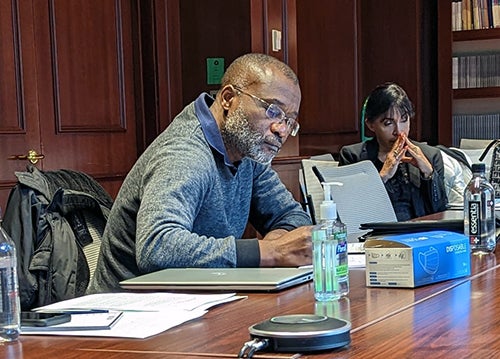
Ludovic Lado SJ, CEFOD, Ndjamena, Chad; Emilce Cuda, the secretary of the Pontifical Commission for Latin America, Rome.
To mark the tenth anniversary of Pope Francis’s election (March 13, 2013), Prof. David Collins SJ, the director of the Catholic Studies program at Georgetown University, and Prof. Christopher Steck SJ, the editor of Theological Studies and a member of the Theology and Religious Studies Department, hosted a workshop — “Pope Francis at 10: Global Perspectives –on November 15-17 at Georgetown.
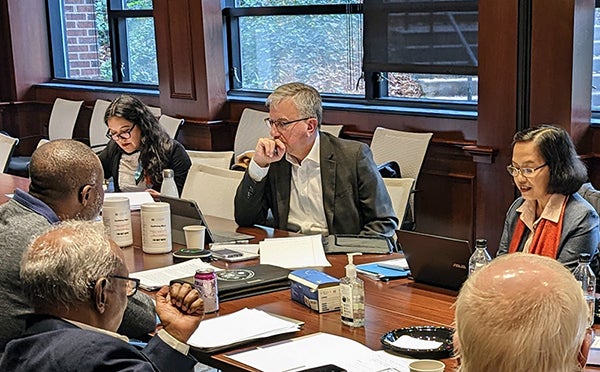
Sandra Arenas, Catholic University of Temuco, Chile; Christopher Steck SJ, Georgetown University; Agnes Brazal, De la Salle University, Manila.
The goal of the workshop was to foster theological assessment of Francis’s impact around the world. The principal participants included leading Catholic theologians from South and Southeast Asia, Oceania, Latin America, Europe, Africa, and the United States.
The major themes that were raised included political theology, synodality, social movements and societal change, just war and environmentalism. The workshop provided the principal participants an opportunity to develop their ideas as they prepare articles that will appear in upcoming issues of Theological Studies to mark the papal anniversary.
Mother Teresa: A Sociological Approach to Spiritual Inspiration and Discouragement.
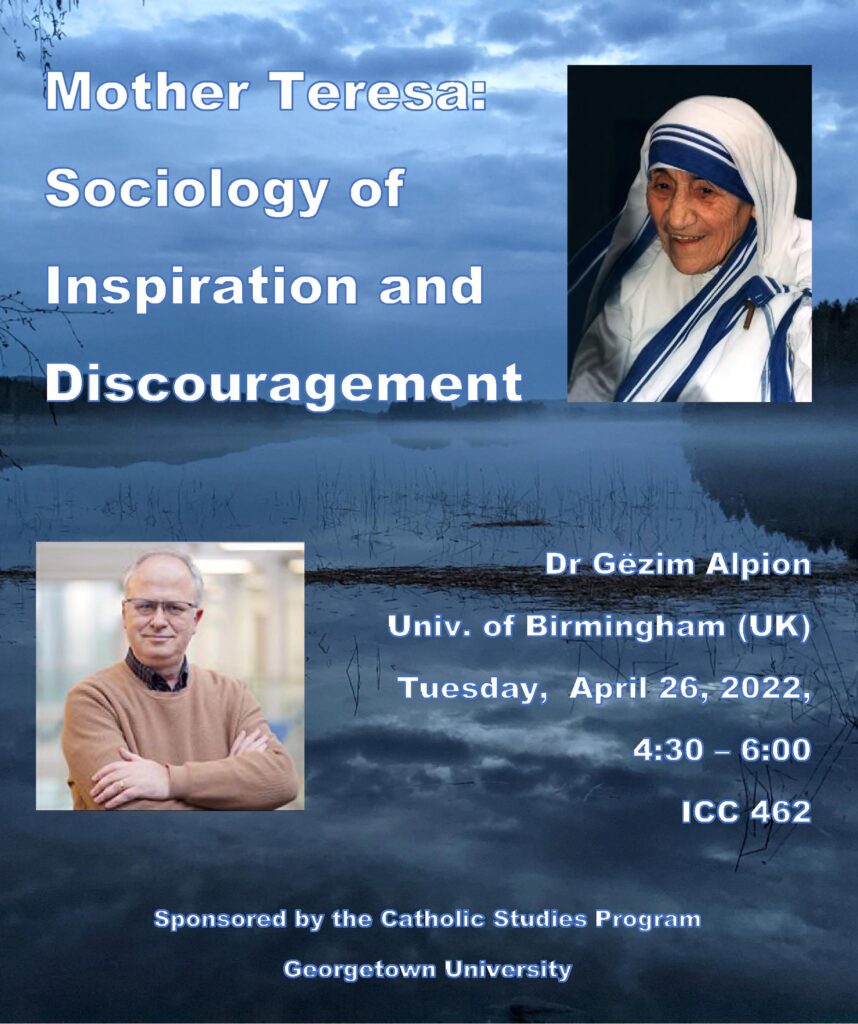
Following the publication of Mother Teresa’s private writings in the 2000s, her supporters have interpreted her ‘dark night of the soul’ as additional ‘proof’ of her ‘sainted’ status while her detractors have employed it to further tarnish her image and legacy. The nun’s spiritual crisis is the object of scholarly scrutiny across many disciplines. The sociologist Dr Gëzim Alpion (University of Birmingham) proposes that the poor, with whom she worked, and her religious community were ‘helpers’ in her lifelong quest to find an elusive God and solve the problem of spiritual darkness. Dr. Alpion’s sociological perspective investigates Mother Teresa’s spiritual void as an incurable condition that is better understood in the context of an array of interrelated personal, familial, ethno-spiritual and cultural milieus.
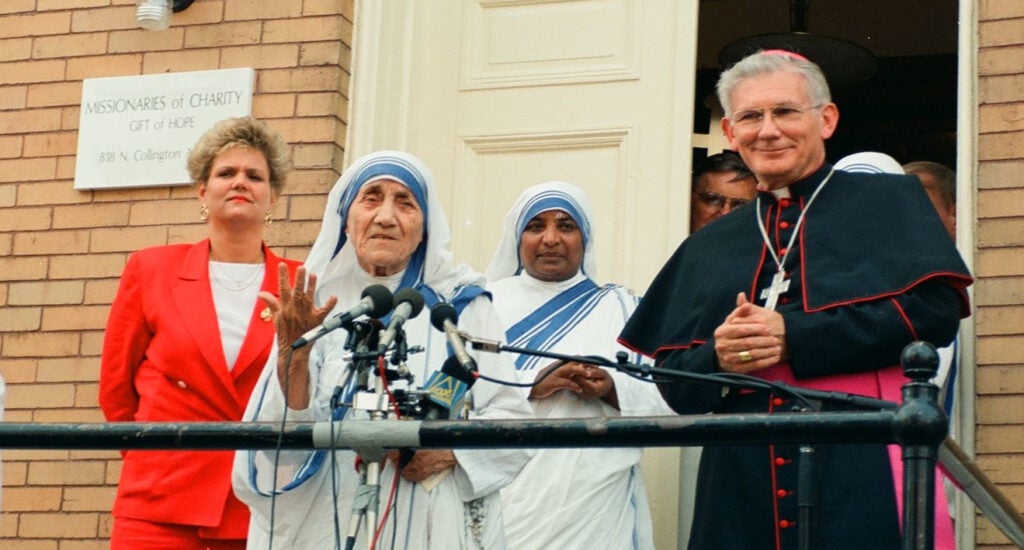
Mother Teresa opens the “Gift of Hope” Home in East Baltimore in 1992.
Dr Gëzim Alpion has a BA from Cairo University and a PhD from Durham University, UK, He lectured at the Universities of Huddersfield, Sheffield Hallam and Newman before joining the Department of Sociology at the University of Birmingham, UK, in 2002. His specializations encompass the sociology of religion, nationalism, fame, race, media, film and authorship.
Dr Alpion has recently published Mother Teresa: The Saint and Her Nation (Bloomsbury, 2020): Focusing on her traumas, ordeals and achievements as a private individual and a public missionary, and her complex spirituality, this book contends that Mother Teresa’s life and her nation’s history, especially her countrymen’s relationship with Roman Catholicism, are interconnected. Unraveling this interconnectedness is essential to understanding how this modern spiritual and humanitarian icon has come to epitomize her ancient nation’s cultural and spiritual DNA.
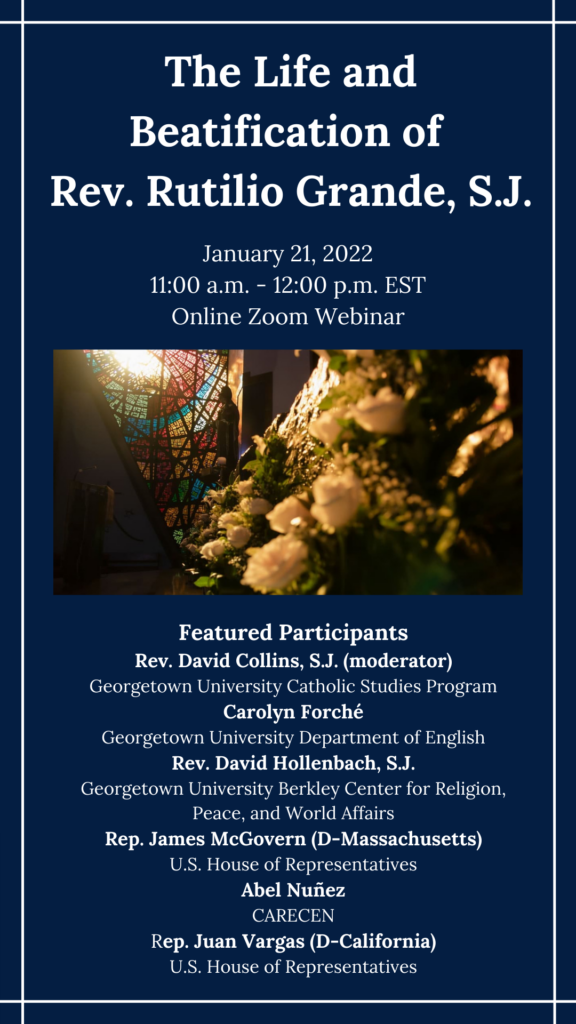
The Life and Beatification of Rev. Rutilio Grande, S.J.
Catholic Studies marked the beatification of the Jesuit Rutilio Grande, a priest murdered for his work on behalf of the poor and marginalized in El Salvador in 1977 with a panel on his life and legacy on Friday, January 21, 2022
The panelists were Georgetown faculty members, Carolyn Forché and David Hollenbach S.J., Congressmen James McGovern (Massachusetts) and Juan Vargas (California), and the community organizer Abel Nuñez (CARECEN).
- A recording of the panel discussion can be found here.
- More information on Fr. Grandé’s life, work, death, and beatification can be found here.
Sixth Annual Jesuit Student Research Symposium
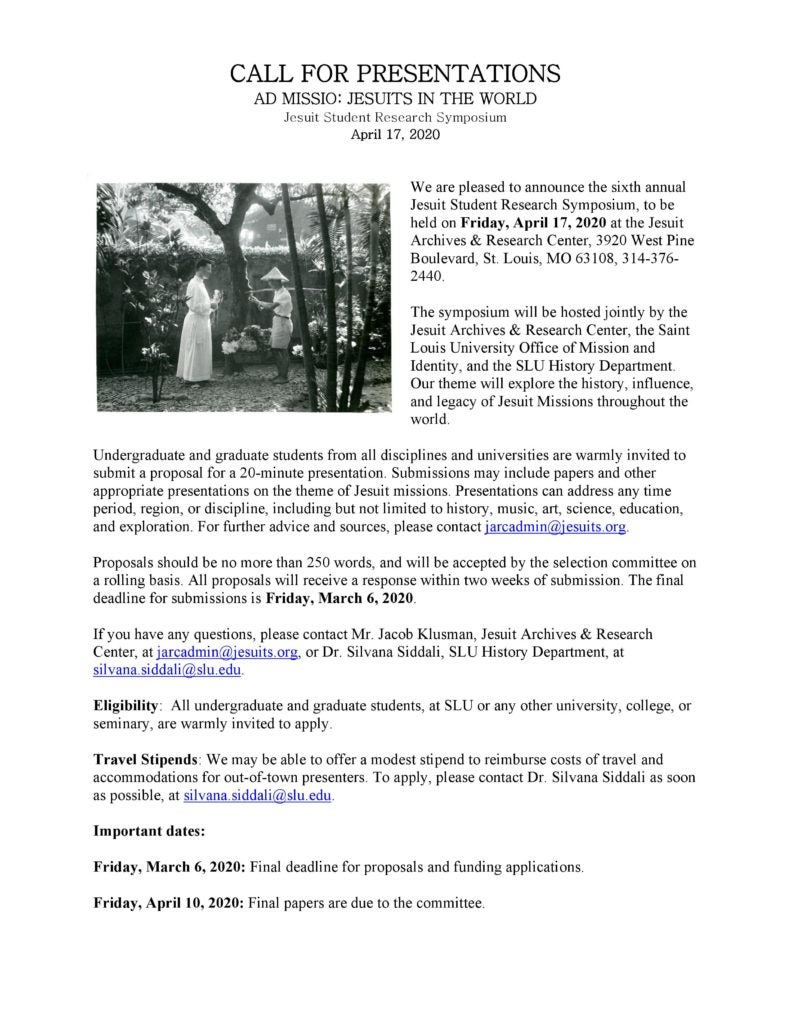
The sixth annual Jesuit Student Research Symposium was held at the Jesuit Archives & Research Center in St. Louis, Missouri. Each year undergraduate and graduate students who are interested in Jesuit History are invited to present their work at a small, friendly conference that draws researchers from around the country. In previous years, there has been a focus on Jesuits and Race, Jesuits and the Sciences, and Jesuits and American culture.
Last year, the Symposium called for papers and presentations on Jesuits in the world. Papers could cover a wide range of topics, from the earliest Jesuit missions to the present day. Proposals should have been no more than 250 words and will be accepted by the selection committee on a rolling basis. All proposals received a response within two weeks of submission.
Talk by Fr. Gregory Chisholm
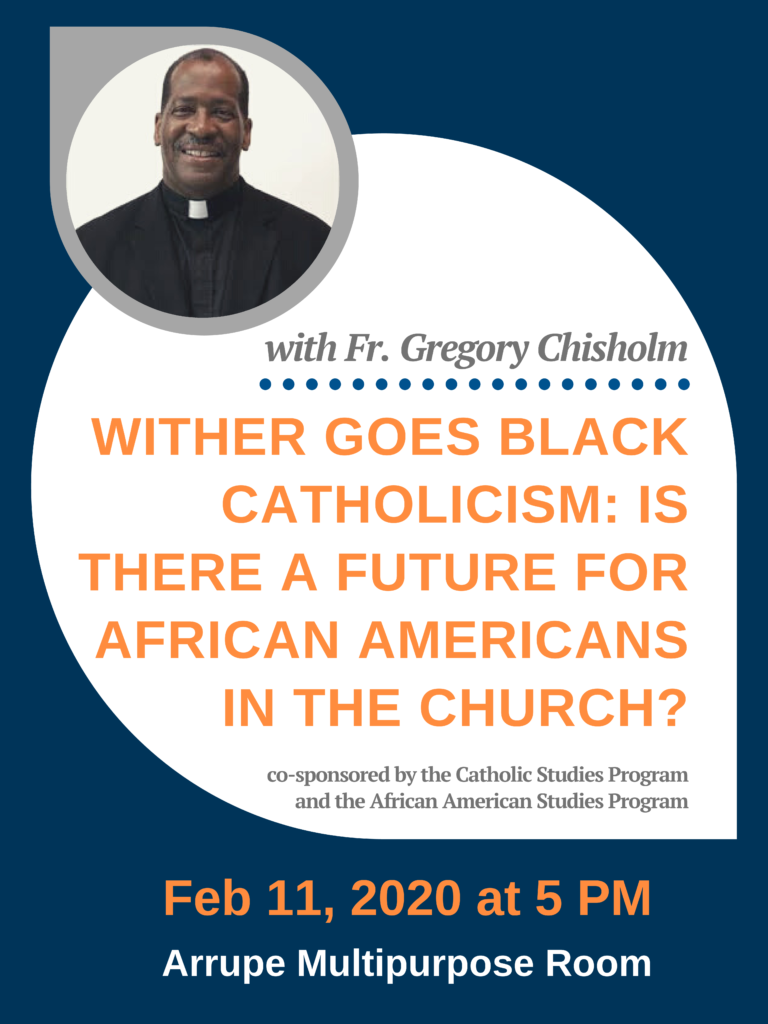
The title of this talk was “Wither goes Black Catholicism: Is there a future for African Americans in the Church?”
Fr. Gregory Chisholm joined the New England Province of the Jesuits in 1980. He now belongs to the USA East Province of the Jesuits and was ordained a priest in 1993. From April 1998 until June 2005 Fr. Chisholm was in full-time parish ministry as Administrator of Holy Name of Jesus Church in Los Angeles.
In 2005 Fr. Chisholm became pastor of an equally diverse parish at St. Patrick Church in Oakland, CA. The parish, with 350 families, has been a ministry of the Society of Jesus since 1999. Fr. Chisholm also taught courses in pastoral practice (presiding, confessional practice, urban ministry, African American ministry) at the Jesuit School of Theology of Santa Clara University in Berkeley, CA. While at the Jesuit School of Theology he taught briefly at Jesuit-run Hekima College in Nairobi, Kenya.
Occurred on February 11, 2020, at 5 pm in the Arrupe Multipurpose Room.
Humanity In Crisis: Ethical and Religious Response to Refugees
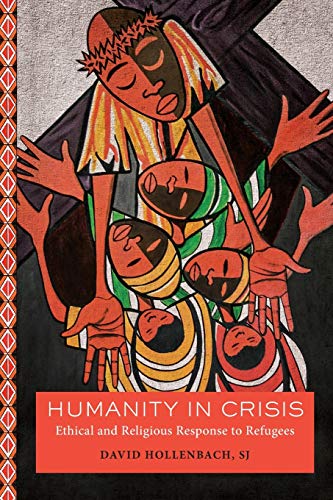
Georgetown University Press hosted a book launch for Fr. David Hollenbach SJ‘s new book, Humanity in Crisis: Ethical and Religious Response to Refugees. It took place on Wednesday, January 22, 2020, at 3:30 pm, on the main campus at Georgetown.
The major humanitarian crises of recent years are well known: the Shoah, the killing fields of Cambodia, the Rwandan genocide, the massacre in Bosnia, and the tsunami in Southeast Asia, not to mention bloody conflicts in South Sudan, Syria, and Afghanistan. Millions have been killed and many millions more have been driven from their homes; the number of refugees and internally displaced persons has reached record levels. Could these crises have been prevented? Why do they continue to happen? This book seeks to understand how humanity is in crisis, and what we can do about it. Hollenbach draws on the values that have shaped major humanitarian initiatives over the past century and a half, such as the commitments of the International Committee of the Red Cross, Oxfam, and Doctors without Borders, as well as the values of diverse religious traditions, including Catholicism, to examine the scope of our responsibilities and practical solutions to these global crises. He also explores the economic and political causes of these tragedies and uncovers key moral issues for both policymakers and for practitioners working in humanitarian agencies and faith communities.
Catholic Higher Education Amidst the Israeli-Palestinian Conflict
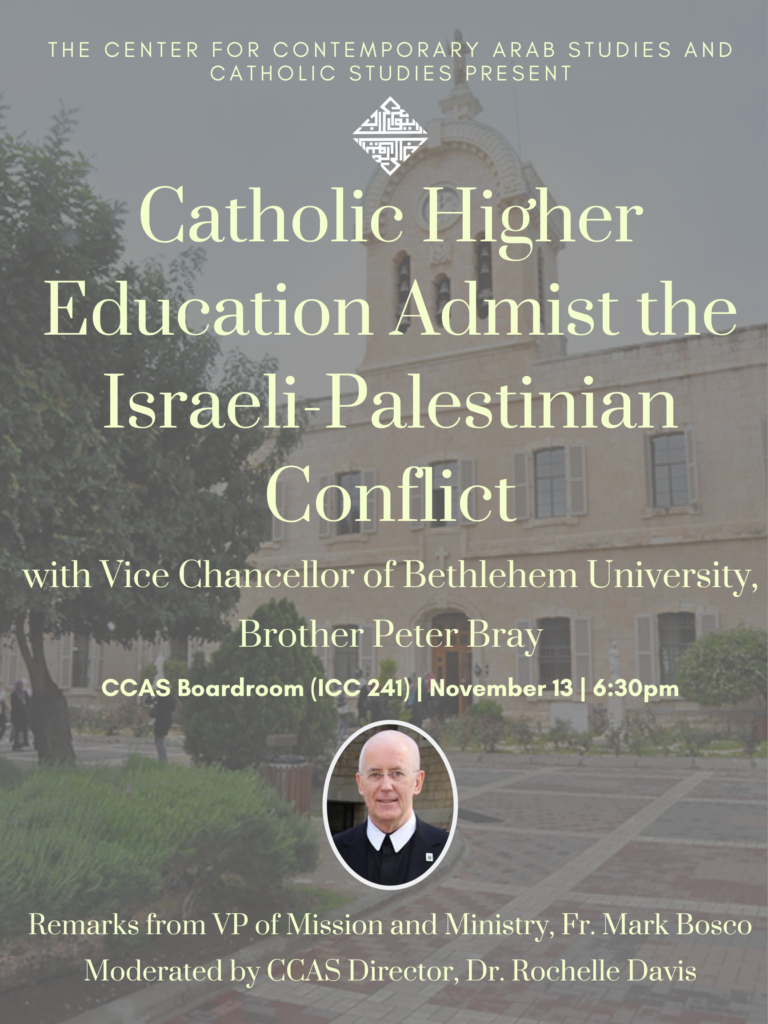
With Vice-Chancellor of Bethlehem University, Brother Peter Bray. Remarks were made by VP of Mission and Ministry Father Marc Bosco and this was Moderated by CCAS Director, Dr. Rochelle Davis.
Brother Peter Bray, FSC, EdD is the 8th Vice-Chancellor of Bethlehem University, the first university established in Palestinian and the only Catholic university in the Holy Land. Brother Peter assumed leadership of Bethlehem University in February 2009 and brings more than 30 years of Catholic education experience as a teacher, consultant, administrator, and expert in leadership and educational systems.
Occurred on November 13, 2019, in the ICC 241 at 6:30 pm.
Movie Night with Fr. Matt Carnes, S.J.
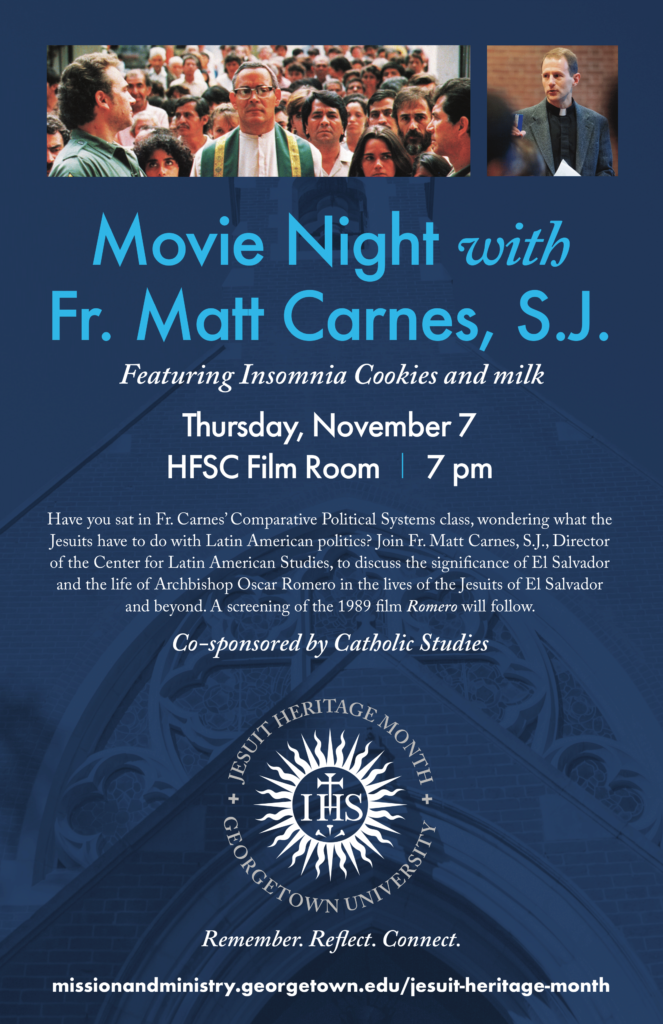
What do Jesuits have to do with Latin American politics? Fr. Carnes, S.J., Director of the Center for Latin American Studies discussed the significance of El Salvador and the life of Archbishop Oscar Romero in the lives of the Jesuits of El Salvador and beyond. A screening of the 1989 film Romero followed. The film is a biographical story about El Salvador’s Archbishop Oscar Romero, who was assassinated by the right-wing military junta while saying mass in 1980.
Occurred on November 7, 2019, in the HFSC Film Room at 7 pm, and featured Insomnia Cookies with milk.
Gauvon Bailey’s Special Lecture
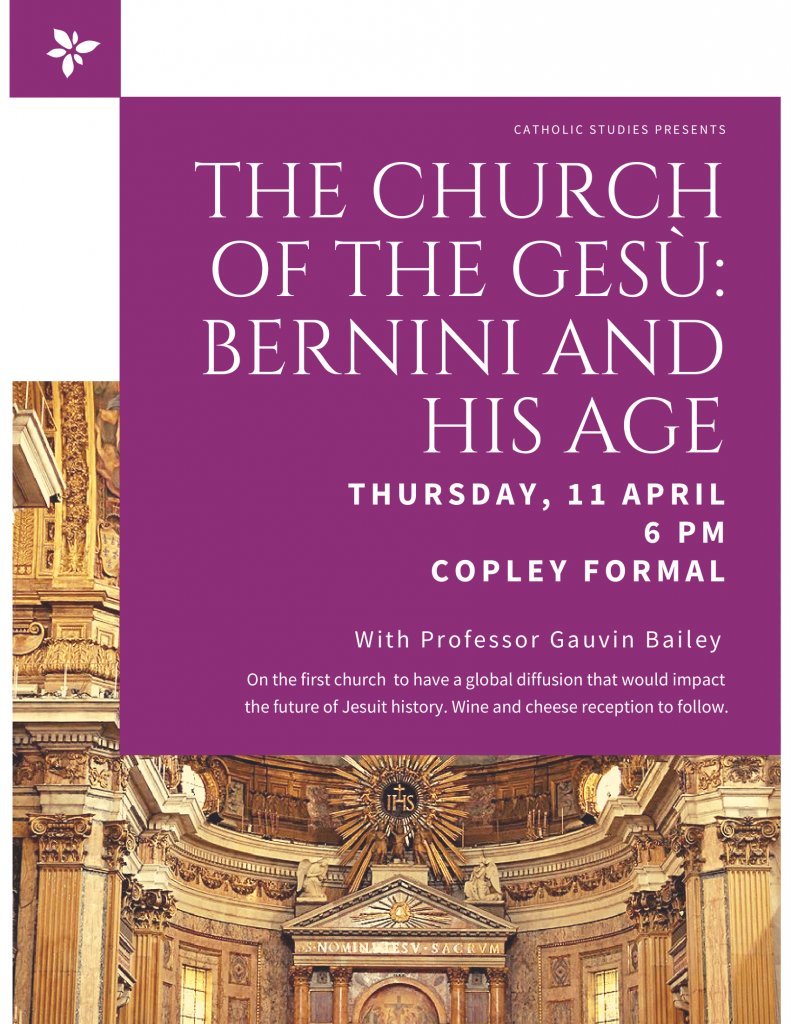
Professor Bailey held a special lecture titled: “The Church of the Gesu: Bernini and His Age.” He detailed on the first church to have a global diffusion that would impact the future of Jesuit history.
Gauvin Alexander Bailey is an American-Canadian author and art historian. He is Professor and Alfred and Isabel Bader Chair in Southern Baroque Art at Queen’s University.
Occurred on April 11, 2019, in Copley Formal at 6 pm, and featured wine and cheese in the following reception.
A Day with Mary Magdalene
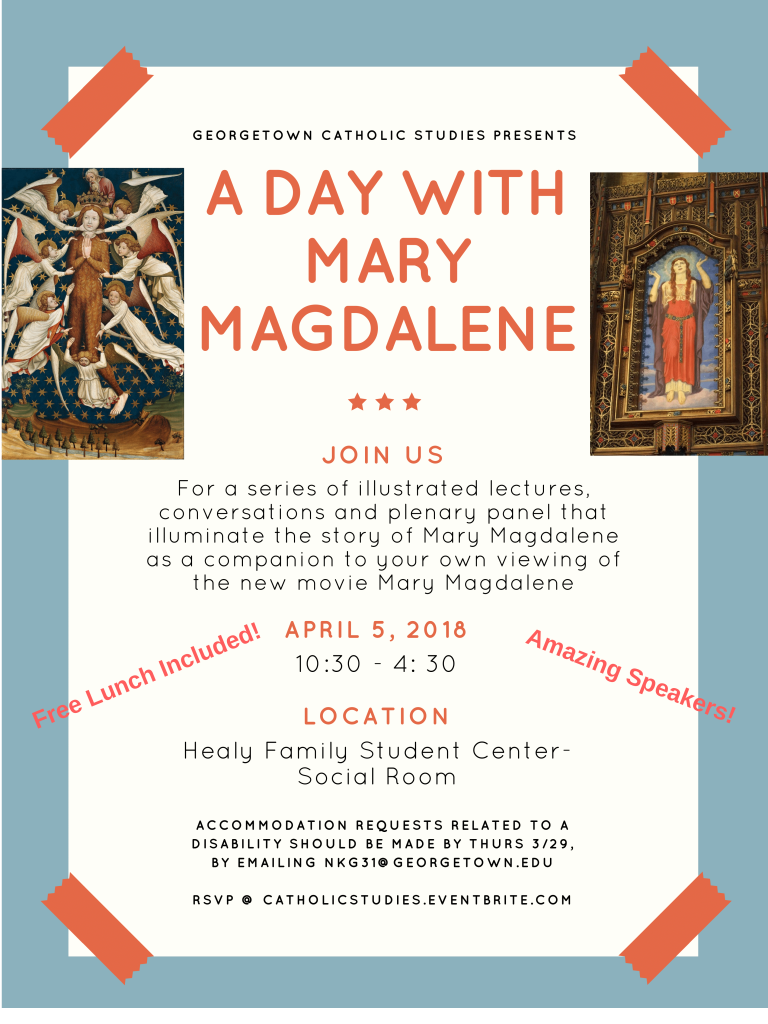
A series of illustrated lectures, conversations, and a plenary panel illuminated the story of Mary
Magdalene as a companion to the viewing of the new movie Mary Magdalene starring Rooney Mara and Joaquin Phoenix (premiered March 30, 2018).
The day-long conference began with coffee followed by these exciting speakers and
topics:
- “The Earliest Magdalene: Varied Portrayals in the Early Gospel Narratives” by Edmondo Lupieri, Loyola of Chicago
- “A Saint for All Seasons: The Versatility of Mary Magdalen in the Early
Medieval Period” by Theresa Gross-Diaz, Loyola of Chicago - “The Medieval Magdalen: Then and Now” by Katherine L. Jansen, Catholic University of America
- “The Magdalene from Canvas to the Silverscreen” by Dr. Diane Apostolos-Cappadona, Georgetown University
- Plenary panel led by Father Mark Bosco
Occurred on April 5th, 2018, in the Healy Family Student Center Social Room from 10:30 am until 4:30 pm, and featured lunch and coffee.
Nuns on the Bus Panel
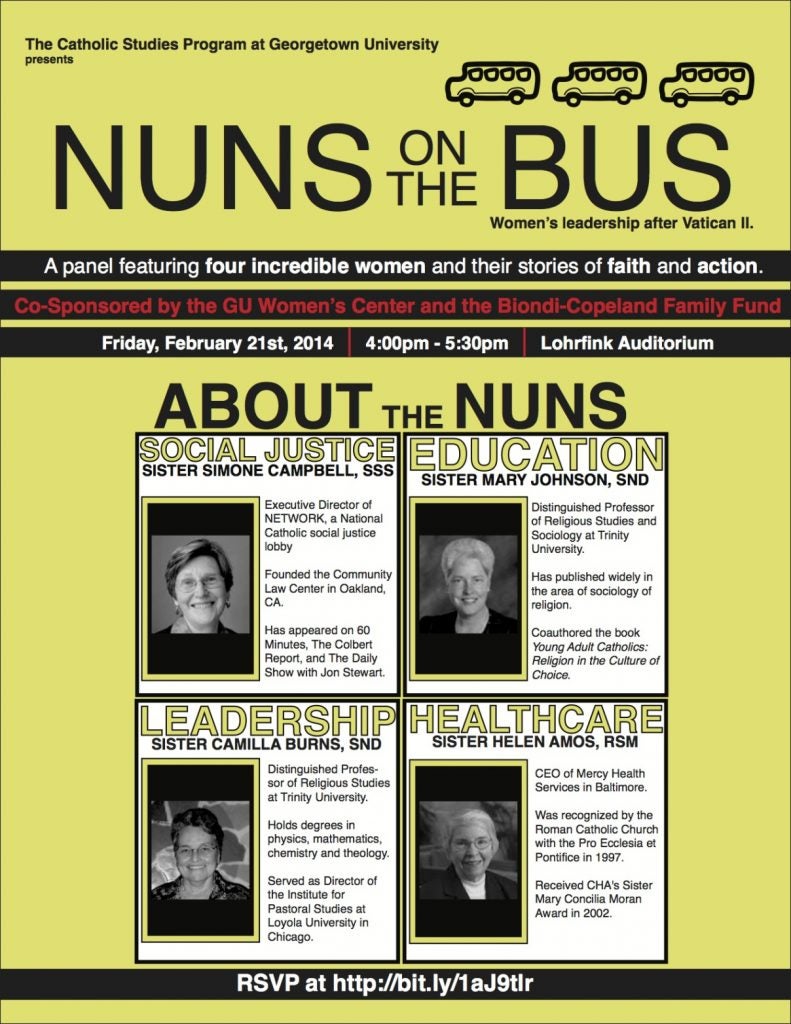
The Catholic Studies Program at Georgetown University presented a panel of four incredible women ad their stories of faith and action. It was co-sponsored by the GU Women’s Center and the Biondi-Copeland Family Fund.
The four women included Sister Simone Campbell, a director of a national Catholic social justice lobby and founder of the Community Law Center in Oakland, CA; Sister Mary Johnson, a distinguished professor at Trinity University and author; Sister Camilla Burns, a distinguished professor at Trinity University and Director of the Institute for Pastoral Studies at Loyola University in Chicago; and Sister Helen Amos, the CEO of Mercy Health Services.
Occurred on February 21, 2014, in Lohrfink Auditorium at 4 pm, and featured cookies.
How God Changes Your Brain
A lecture by Dr. Andrew B. Newberg, a pioneer in the area of “Neurotheology.” Occurred in October 2013.
Dr. Newberg discussed how belief in God corresponds to neural changes, the impact of prayer and spirituality on the promotion of health and well-being, and the neural correlates of religious practices and experiences.
- View a recorded excerpt from his lecture on the parts of the brain and their role in religious experience.
- View another recorded excerpt on the concept and meaning of God.